

Faculty of Biology and Ecology
Address: 24, N.Armstrong str., 17 facility of DNUDean's office phone: +38 (056) 760-84-38
E-mail: dekanat.bef.dnu@i.ua
Web: https://www.biofaculty-dnu.dp.ua/
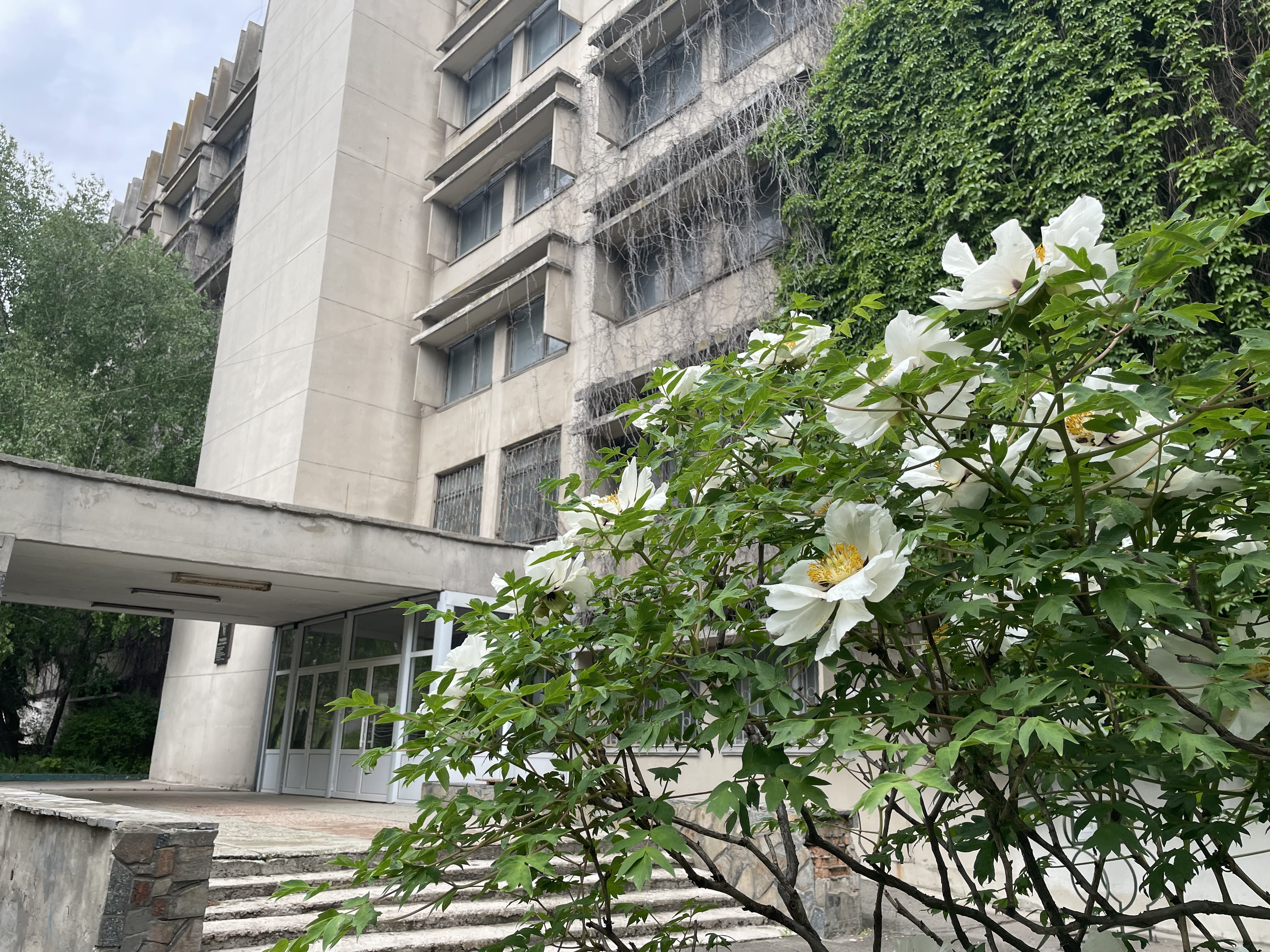
Faculty of Biology and Ecology
Historical Background
The history of the nowadays Faculty of Biology and Ecology dates back to the time of foundation of the university, when in 1918 the Ekaterinoslav Higher Women's Courses were reorganized into the Ekaterinoslav University, and on the basis of its physics and mathematics faculty, a biological one was founded.
In the spring of 1918, the Department of Zoology of Invertebrates was opened at the Faculty of Biology, in August 1918 – the Department of Plant Physiology was founded, and in June 1920 the Department of Animal Physiology was organized too.
In 1924, the Zoological Museum of the Faculty was established, and in 1929 the Botanical Garden of the University was laid. At the same time a research Department of Biology appeared. In 1932, the Department of Botany is divided into the Department of Geobotany and Lower Plants and the Department of Hydrobiology. The hydrobiological station, which operated under the chair of the Department of Botany, is transformed into the Institute of Hydrobiology and became a part of the Department of Lower Plants and Hydrobiology. In 1936, not far from the village Vil’ne in the Novomoskovsk District the Biological Station was open. That was a scientifical complex, where teachers and students of the Department of Geobotany work and study. In the same year, the Institute of Physiology was established on the basis of the Department of Physiology of Animals. In 1937 the Department of Zoology is divided into the Department of Zoology of Invertebrates and the Department of Embryology and Comparative Anatomy, and the following year the Department of Zoology of Vertebrates is allocated from the Department of Embryology and Comparative Anatomy and Zoological Museum is transferred to it. In 1938, the biochemical laboratory, which operated as part of the Department of Animal Physiology, became the basis for the creation of the Department of Biochemistry. Such rapid development of the faculty allowed it to become in the early of 1940s one of the largest scientific and educational centers in the state with the widest profile of specialties.
During the Second World War, the Faculty of Biology was partially evacuated, and those lecturers, who remained in the occupied city, continued the educational process. Since 1945, all departments of the faculty have been renowated their activities. In 1947, the Department of Hydrobiology expands its profile and receives a new name – “Hydrobiology and Ichthyology”. In 1949, a complex expedition of the University was organized to study the natural and artificial forests of the steppe zone of Ukraine and Moldova. In 1953, the Department of Biochemistry temporarily merged with the Department of Human and Animal Physiology, and in September 1963 it was again separated into an independent Department with a new name – the Department of Biophysics and Biochemistry. In 1970, the Department of Microbiology was founded, in which two scientific research units were created almost immediately: the Laboratory of Experimental Microbiology and the Biogeochemistry Laboratory, which later became a structural subdivision of the geological and geographical faculty. In 1986, the educational and scientific complex “Aquarium” was opened, where various types of aquatic animals are exhibited, as well as educational and scientific work of staff, lecturers and students of the Department of Ichthyology and Hydrobiology, which in 1990 was renamed the Department of “Ichthyology, Hydrobiology and ecology”.
In 1992, due to the significant contribution of faculty’s scientists to the development of bioecological research, the biological faculty was renamed into the “Faculty of Biology and Ecology”. Since 1997, the Department of Microbiology has been renamed on the Department of Microbiology and Virology. In 2004, the Department of Plant Physiology received a new name – "Physiology and Introduction of Plants". In 1997, the University opened a Medical Faculty, which in 2004 joined the Faculty of Biology and Ecology as a Department of Clinical Laboratory Diagnostics. Due to this in 2009 Faculty was renamed into the Faculty of Biology, Ecology and Medicine. In 2011, the Department of Ichthyology and Hydrobiology was renamed the Department of General Biology and Aquatic Bioresources. Further expansion of the range of scientific interests of the Department of Microbiology and Virology into the field of biotechnology led to the fact that in 2012 the department received a new name "Microbiology, Virology and Biotechnology" and began training in the specialty "Biotechnologies and Bioengineering".
In 2017, after the establishment of the Faculty of Medical Diagnostic and Rehabilitation Technologies and the transfer of the Department of Modern Diagnostic Technologies of the Treatment Process to its structure, the faculty regained its original name, "Faculty of Biology and Ecology."
Today, the Faculty comprises 5 departments:
Department of Biochemistry and Physiology
Department of General Biology and Aquatic Bioresources
Department of Biodiversity and Ecology
Department of Microbiology, Virology, and Biotechnology
Department of Plant Physiology and Introduction
All departments are graduating departments and provide professional training in their respective fields.
In addition, the faculty includes the educational and scientific complex "Aquarium," the zoological museum, the herbarium, the botanical garden, and the Belhgard International Biosphere Station. Much scientific research is conducted jointly with the Research Institute of Biology, whose laboratories are located within the faculty's premises.
The modern Biological and Ecological Faculty of Oles Honchar Dnipro National University is a leading center for educational, scientific, and cultural enlightenment work in the biological, ecological, and biotechnological fields in the Dnipro region. The faculty provides training for biology teachers for secondary educational institutions in the city and region.
37 teachers provide the educational process at the faculty: 9 professors and 28 associate professors. Among them are academicians and corresponding members of public sciences. Professor Alexander Pakhomov has been awarded the honorary title "Merited Scientist and Technologist of Ukraine."
In the full-time Department of the Faculty, 430 students are currently studying in the following programs: Biology, Secondary Education (Biology and Human Health), Ecology, Biotechnology and Bioengineering.
Management staff of the Faculty
Dean of the faculty - Dr., prof. Olena Severynovska, head of the Biological Section of the Dnipro Scientific Center of the National Academy of Sciences of Ukraine;
Responsible for educational work - PhD, docent Tetyana Sharamok;
Responsible for educational work - PhD, docent Tetyana Kolombar;
Responsible for the scientific work - PhD, docent Vadym Horban;
Responsible for international cooperation - PhD, docent Nina Kuragina.
Structural Subdivisions
- Department of Biochemistry and Physiology
- Department of Plant Physiology and Introduction
- Department of General Biology and Aquatic Bioresources
- Department of Microbiology, Virology and Biotechnology
- Department of Biodiversity and Ecology
The Faculty Invites to Visit
The Faculty of Biology and Ecology invites you into the world of science and innovation!
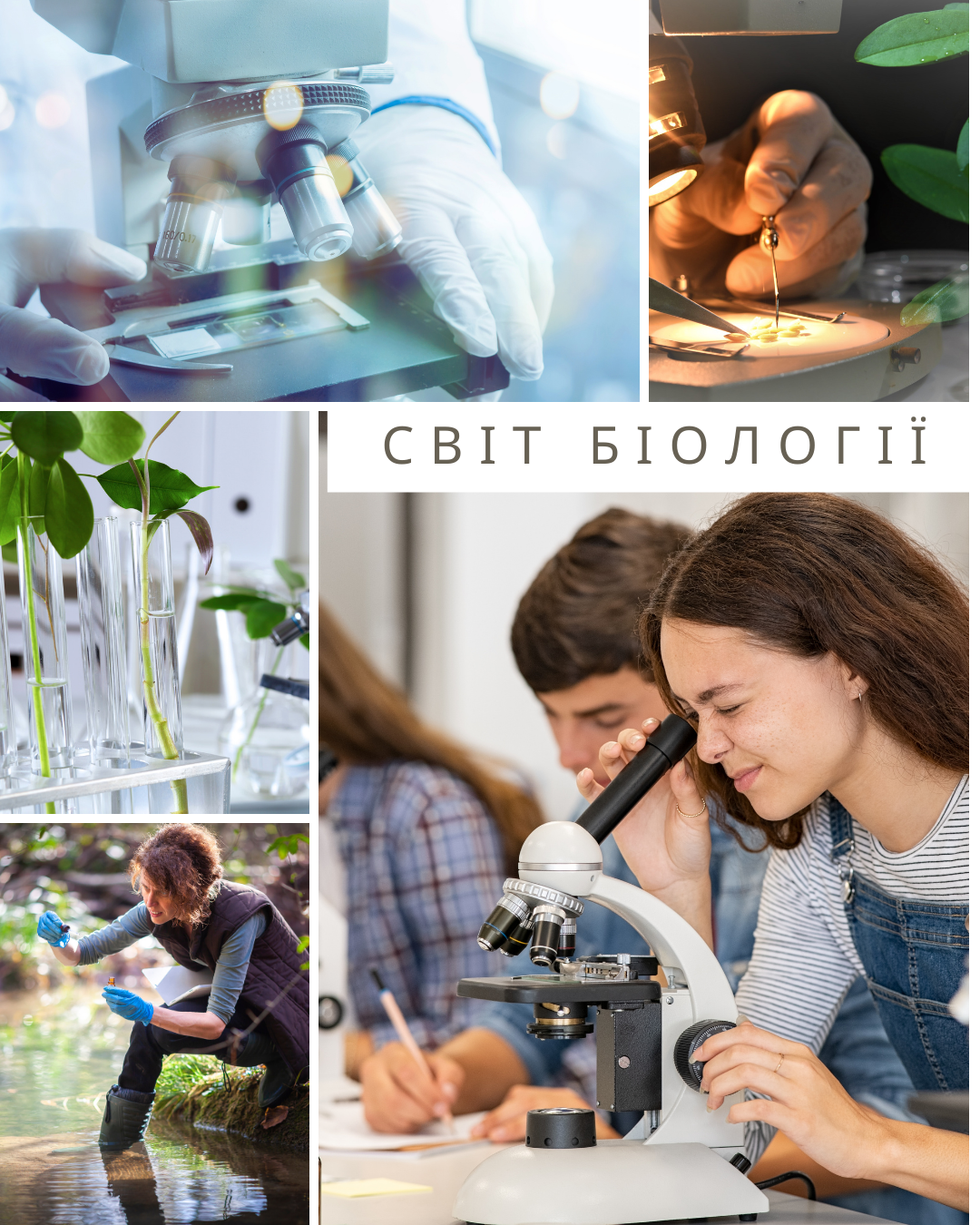
Do you dream of exploring the world of living nature, tackling environmental challenges, or creating the biotechnologies of the future? The Faculty of Biology and Ecology opens up endless opportunities for you!
Why study with us?
Modern Laboratories and Research
You will have access to scientific centers, where you can conduct experiments and field research under the guidance of experienced scientists.
Practical Training and Real-World Cases
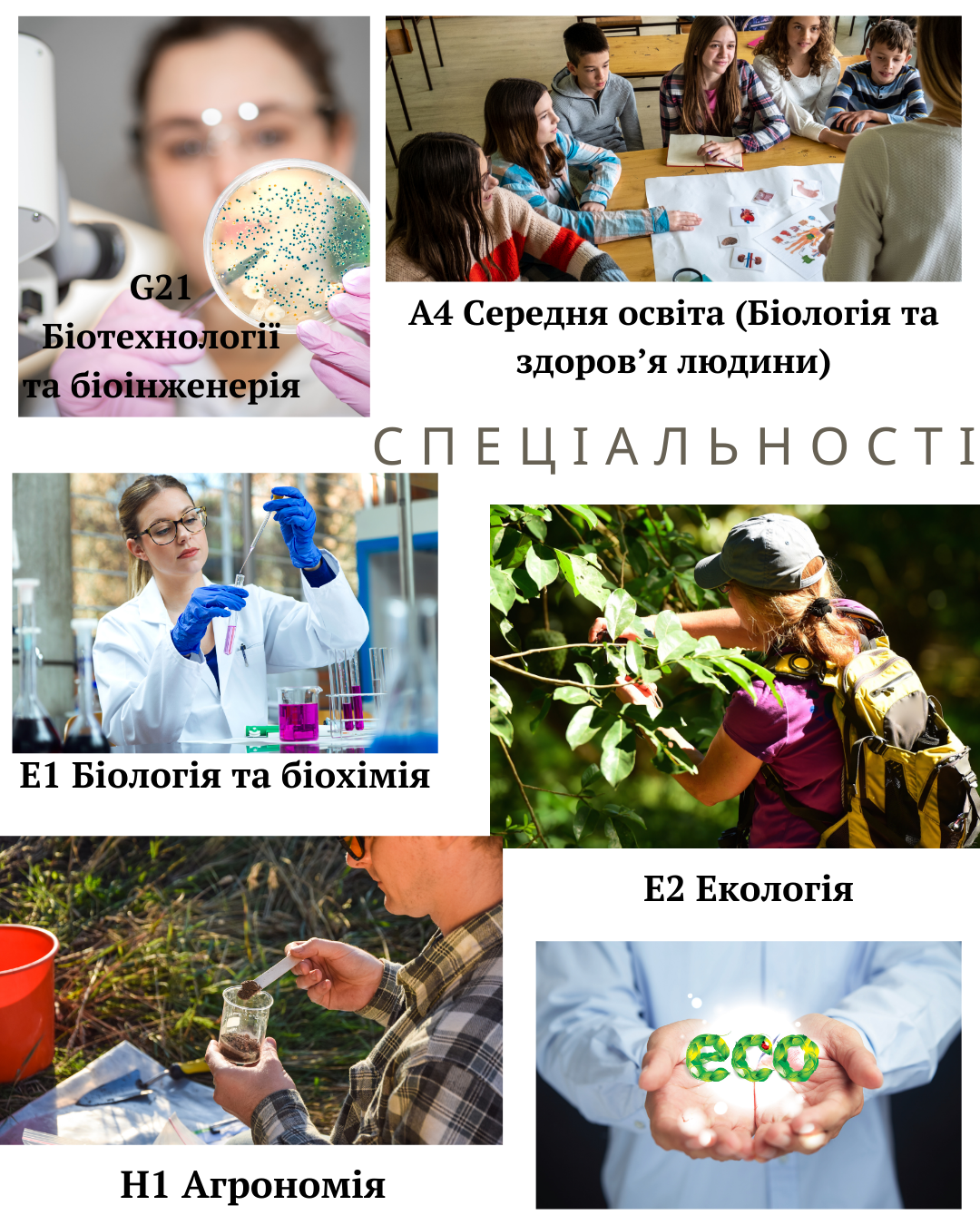
Our programs focus on hands-on experience, allowing you to apply your knowledge to real-world challenges.
Our programs are designed not only to teach you theory but also to help you apply it in practice. You will have the opportunity to work with ecosystems, study organisms, analyze climate change, and even participate in international scientific projects!
A Wide Range of Study Programs
From molecular biology to ecosystem research – choose the path that inspires you and become a specialist in your future profession!
Career Prospects
Our graduates successfully work in scientific institutions, biotechnology companies, international environmental organizations, pharmaceutical corporations, and educational institutions worldwide.
Together, we work on preserving nature, implementing ecological technologies, and advancing science.
Join Our Open Days!
Want to learn more?
Visit our faculty! You will get to explore our laboratories, meet students and professors, and receive answers to all your questions.
Join our meetings and webinars to learn more about study programs and internship opportunities.
Be part of the team that changes the world!
Join Our Open Days!
Want to learn more?
Visit our faculty! You will get to explore our laboratories, meet students and professors, and receive answers to all your questions.
Join our meetings and webinars to learn more about study programs and internship opportunities.
Be part of the team that changes the world!



Open Day event, April 13, 2024.
We conduct presentations and informational sessions to present the main aspects of studying at the faculty, specializations, and opportunities for students, as well as share the experiences of our graduates and students.
We organize tours for prospective students around our campus, the botanical garden, the "Aquarium" educational and scientific complex, and the zoological museum, where they can see educational and research laboratories and get acquainted with student life at our faculty.
Our faculty members' professors and associate professors conduct workshops, lectures, quizzes, and contests for prospective students to deepen their understanding of the subject and determine whether this direction aligns with their interests.




Quiz and awarding of quiz winners among schoolchildren of the city and region, April 1, 2024




Workshop for lyceum students of the Kamian Scientific Lyceum
We provide online resources for applicants where you can find information about entry requirements, study programs, scholarship programs, and other aspects of student life at our faculty.
These activities will help you get a complete picture of studying at the Faculty of Biology and Ecology and make the right decision about your future studies.
Students, teachers and scientists of the faculty participate annually in the Interpipe TechFest, at the DNU Pavilion, where they demonstrate modern scientific achievements.
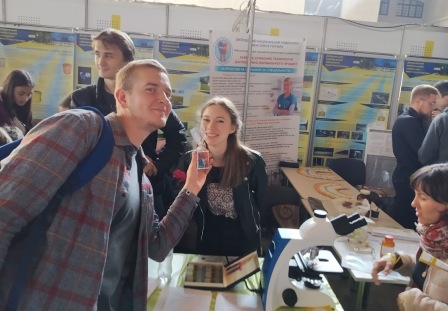
Faculty of Biology and Ecology at Interpipe TechFest
On the Day of Science, which was held in the fall of 2019 in the Botanical Garden of DNU, students created a demonstration stand, which symbolically displayed all kinds of pollution of the aquatic environment. The main purpose of this event was to draw the attention of those present to the crisis status of aquatic ecosystems and the need to combat water pollution.
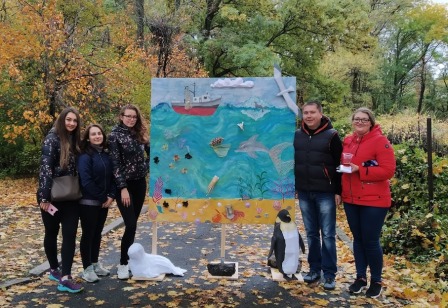
Science Day at the Botanical Garden of DNU, 2019
In October 2019, a team of students from the faculty participated in the NASA Space Apps Challenge – the largest international space hackathon, organized by the Noosphere Engineering School Association with the support of NASA (National Aeronautics and Space Administration) in different countries. It was project on environmental issues of the Dnieper River.
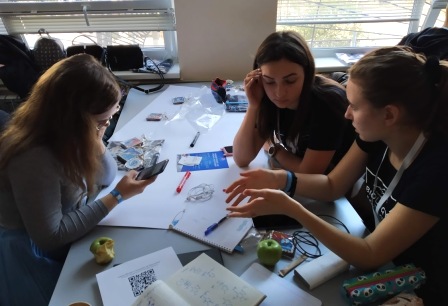
Team of Biology Students at NASA Space Apps Challenge Dnipro Project Contest
The Faculty of Biology and Ecology is actively involved in the career guidance of young people. Each year, the faculty assist in the development of tasks and conducting bioquests for the students of high school and the Small Academy of Sciences (MAS). Bioquests are aimed at young people's interest in environmental issues and the formation of environmental awareness. Usually they are conducted on the basis of the Botanical Garden of the DNU and the Scientific-educational complex "Aquarium".

The “Become a One Day Student” event is also interesting for schoolars. Faculty teachers conduct short classes of 45 minutes with schoolars of grades 8-11. They are assisted by graduate students and students. Students communicate with schoolars, tell them about their impressions of studying at the university, help determine their choice of future specialty.
Also in the winter of 2020, the faculty conducted a test IEE in biology, which was visited by about 100 students of the city and the region.
The fact that our events are not only useful, but also very interesting for pupils of last year in school, you can see on the example of past events.
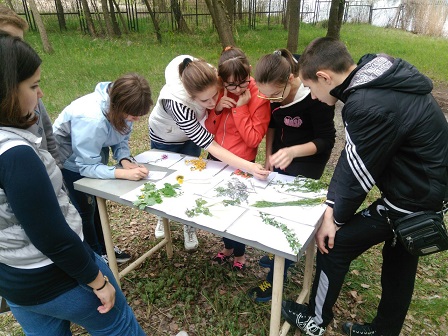

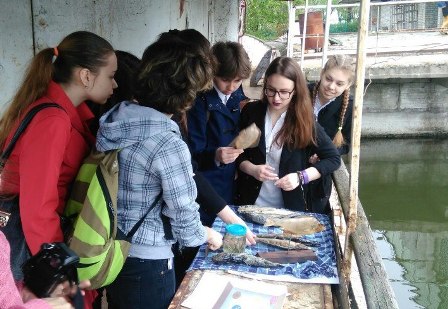
Promotion for for pupils of last year in school “Become a student of a FBE for 1 day”


Biological quest for pupils of last year in school of the Dnipro region

Follow the updates on the University's and Faculty's websites!
Waiting for you!
Waiting for you!
Educational Activities
The Faculty provides education at the first (bachelor's) level of higher education under the following educational programs:
A4 Secondary Education (Biology and Human Health)
EP Secondary Education (Biology and Human Health)
E1 Biology and Biochemistry
EP Systems Biology and Hydro Bioresources
EP Biodiversity and Landscape Design
EP Microbiology and Virology
E2 Ecology
EP Ecology
G21 Biotechnology and Bioengineering
EP Biotechnology and Bioengineering
H1 Agronomy
EP Plant Protection and Quarantine
A4 Secondary Education (Biology and Human Health)
EP Secondary Education (Biology and Human Health)
E1 Biology and Biochemistry
EP Systems Biology and Hydro Bioresources
EP Biodiversity and Landscape Design
EP Microbiology and Virology
E2 Ecology
EP Ecology
G21 Biotechnology and Bioengineering
EP Biotechnology and Bioengineering
H1 Agronomy
EP Plant Protection and Quarantine
The Faculty provides education at the second (master's) level of higher education under the following educational programs:
A4 Secondary Education (Biology and Human Health)
EP Secondary Education (Biology and Human Health)
E1 Biology and Biochemistry
EP Biochemistry and Physiology
EP Systems Biology and Hydro Bioresources
E2 Ecology
EP Ecology
G21 Biotechnology and Bioengineering
EP Biotechnology and Bioengineering
The Faculty provides education at the third (PhD) level of higher education under the following educational programs:
E1 Biology and Biochemistry
PSP Biology and Biochemistry
E2 Ecology
ESP Ecology
A4 Secondary Education (Biology and Human Health)
EP Secondary Education (Biology and Human Health)
E1 Biology and Biochemistry
EP Biochemistry and Physiology
EP Systems Biology and Hydro Bioresources
E2 Ecology
EP Ecology
G21 Biotechnology and Bioengineering
EP Biotechnology and Bioengineering
The Faculty provides education at the third (PhD) level of higher education under the following educational programs:
E1 Biology and Biochemistry
PSP Biology and Biochemistry
E2 Ecology
ESP Ecology
Research Institute of Biology of Oles Honchar DNU
The Research Institute of Biology is the leading scientific institution in the Dnipro region, where comprehensive research and development in the field of modern biology and ecology is carried out, and it is also a scientific and educational base for the training of specialists in biology and ecology.
Phone: +38 (056) 776-58-83
E-mail: ndi_biol_dnu@i.ua
Dnipro State Hydrobiological Station as a forerunner of the modern Scientific Research Institute of Biology was established in 1927. In 1934, the station was reorganized into the Dnipro Research Institute of Hydrobiology at the DSU. Dnipro is actually becoming the center of hydrobiological research in southeastern Ukraine. In 1974 the Scientific Research Institute of Hydrobiology was renamed into the Scientific Research Institute of Biology.

The first director of the Institute of Biology was a corresponding member of Academy of Sciences of the Ukrainian SSR prof. D.O. Svirenko, then – prof. G.B. Melnikov, P.A. Zhuravel, I.P. Lubianova, A.N. Vinnichenko. In the Institute of Biology worked such outstanding scientists as the Hero of the Soviet Union prof. P.Shirshov, academician of the Academy of Sciences of the Moldavian SSR, Professor M.F. Yaroshenko and S.P. Fediy. Now the institute is headed by Cand. Biol. Sciences, Senior Researcher I.A. Ivanko.
Nowadays fundamental research is being carried out in the Scientific Research Institute of Biology in the scientific fields: preservation of the environment and its sustainable development, newest biotechnologies, diagnostics and methods of treatment of the most common diseases, applied research is being carried out to solve urgent problems of the development of the national economy of Ukraine, economic contracts are being negotiated with enterprises of various forms of ownership, which makes it possible to introduce the results of research into production.
Research and service laboratories are equipped with modern equipment. On their basis today fundamental state budgetary themes are being executed, the scientific leaders of which are the leading scientists of the faculty and institute: Doctors of Biological Sciences, Professors O.Ye. Pakhomov, A.M. Vinnichenko, A.I. Vinnikov, G.O. Ushakova, Cand. Biol. Sciences, Senior Researcher A.F. Kulik, Cand. Biol. Sciences, Senior Researcher, Associate Professor K.K. Goloborodko.
Vivarium
Currently Vivarium provides the educational and scientific process with laboratory animals. It includes: a laboratory for breeding and rearing animals, a laboratory for herpetology, a forage and an insulator. Vivarium is a training base for students where they practice, master techniques for caring for laboratory animals, and also it is a scientific base for studying, acclimatization and breeding of rare and endangered animals.
Zoological Museum
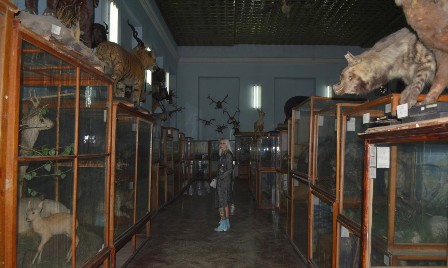
The Zoological Museum of the Oles Honchar DNU was established in 1924 on the basis of exhibits from the Museum of Local Lore (now the D. Yavornytsky Historical Museum). Today the Zoological Museum is a scientifical, cultural, educational and environmental department of the University.
The main goal of the museum is to study rare and typical species of local and world fauna by creating, updating and preserving zoological collections, conducting scientific, educational and educational work.
The collection of the museum allows you to see many kinds of living beings, and background images allow you to imagine them in their habitats. Visiting the exposition, its participants are involved in the study and preservation of the natural and historical and cultural heritage of our people.
Today the zoological museum of Oles Honchar DNU is a part of the State Museum Fund of Ukraine. The total number of exhibits is more than 1800 units of storage.
Particularly of great value are exhibits that have been preserved since the foundation of the museum, since they represent the original composition of the fauna of the Dnieper region before the full anthropogenic transformations of the landscapes that took place during the 20th century. This collection contains “reference” specimens of various species, which, unfortunately, no longer live in the Dnieper region.
The Zoological Museum is the base for training bachelors and masters in the specialties "Biology" and "Ecology", where they receive professional knowledge. On the basis of the museum there are a regular classes are held with young naturalists of the Young Academy of Science.
The Zoo Museum is also open for educational work among the general population, children and adults who want to get acquainted with the living animal world that makes up our immediate surroundings, as well as with fossil objects.
The museum is included in the list of interesting places of the Dnipro city and the region and it is really an interesting excursion object. Every year it is attended by thousands of people to which the museum staff conduct a variety of excursions: “The Organism and the Environment”, “Wealth of the Animal World”, “Evolution of the Animal World”, “The Origin of Man”, “Animals and Their Ecological Importance”, “The Use of Industrial Animals in the Food industry”, “Fur animals and their ecological significance”, “Bionics and its future”, “Protection of the animal world”, “By the pages of Red Books”.
Within the charity program, the museum visits many children from poor families, orphans and invalids every year.
Herbarium of the Oles Honchar Dnipro National University
The herbarium of the Oles Honchar DNU is an invaluable collection of samples of the plant world. It was created in 1918 on the basis of collections of famous naturalists of the late XIX - early XX centuries I.Ya. Akinfiyev and A.A. Grossgeim. The modern herbarium is located at the Department of Geobotany, Soil Science and Ecology of the Oles Honchar DNU and has about 100 000 samples, among them I.Ya. Akinfiyev, A.A. Grossgeim, O.L. Belgard and samples collected by the main collectors A.A. Eliashev, Т.S. Heydemann, O.L. Belgard, A.P. Travlev, M.A. Albitsky, V.V. Tarasov, B.O. Baranovsky, L.P. Motsyk and others.
The flora of the South-East of Ukraine, various regions of Russia (Rostov, Tomsk, Leningrad, Arkhangelsk regions, etc.), the Caucasus, Central Asia, and also some countries of the far abroad are represented in the herbarium. In 1960, part of this herbarium was demonstrated in Paris at the World Exhibition. In addition, the herbarium of the Oles Honchar DNU contains a significant number of samples used in the conduct of scientific research and educational process.
O.L. Belgard International Biosphere Station

In 1934, O.L. Belgard in the middle reaches of the river Samara was organized a forest observation post, which turned into a recognized ecological center of Ukraine – the International Biosphere Station. It includes scientific and training laboratories equipped with modern instruments, 9 monitoring profiles with a total length of 125 km, 23 operating hydrological wells, a weather station. At this place have a practice the students of Oles Honchar DNU, universities of Kriviy Rih, Kharkiv, Melitopol, Kyiv, Moscow, St. Petersburg, students of the Young Academy of Science, young naturalists, teachers.
International and state conferences, symposiums and meetings of problem councils of Ukraine are held on the basis of the Station.
Prisamar international biosphere station is an international ecological center of Ukraine for research of reference natural and artificial forests, technogenic ecosystems of the steppe zone of Ukraine, general and applied ecology. It is part of the network of environmental stations in Ukraine, the CIS, UNESCO, has close contacts with scientific institutions in France, Germany, the United States, Canada, India, Spain, Israel, EU and CIS countries.
Educational and Scientific Complex “Aquarium”
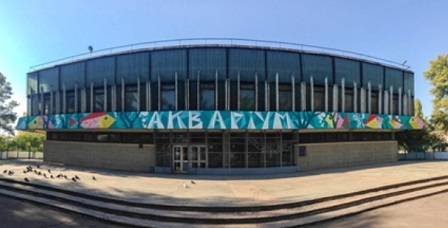
In 1985, on Monastyrsky island of the Dnipro city was built a unique in scale and technical equipment – the educational and scientific complex “Aquarium” – a living museum of freshwater flora and fauna. Today it is an scientific, educational, cultural and environmental department of the Oles Honchar Dnipro National University and has no analogues in other higher educational institutions of Ukraine.
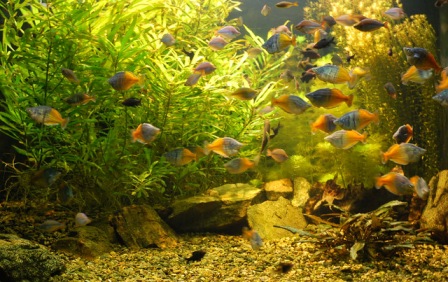
In the exhibition hall of the “Aquarium” there are 20 aquariums, the volume of each is 1200 liters. In it there are a fish from Europe, Asia, Australia, Africa, South and North America. The population of aquariums is selected by regions of their natural habitat, and the aquariums themselves are located in the exposition by blocks, each of which is dedicated to the freshwater population of one of the continents. The central part of the hall is occupied by a skeleton aquarium of the “tunnel type” with a total volume of 100 000 liters, made of 20-20 mm thick silicate glass. It is inhabited by fish of natural reservoirs of Ukraine, as well as acclimatized and hybrid forms grown in fish farms of Ukraine. The aquariums of the exposition clearly illustrate the interesting and complex life of the inhabitants of fresh water, with rare and interesting species of the world flora and fauna.
The Educational and Scientific Complex “Aquarium” is visited annually by thousands of people – both specialists in the environmental field, and the population of the city and the Dnipro region, and other regions of Ukraine. In ESC "Aquarium" various environmental, cultural, educational and organizational events are held.
Phones: +3 (0562) 46-13-25 (tickets); +3 (056) 377-81-72 (director).
Botanical Garden of the Oles Honchar DNU
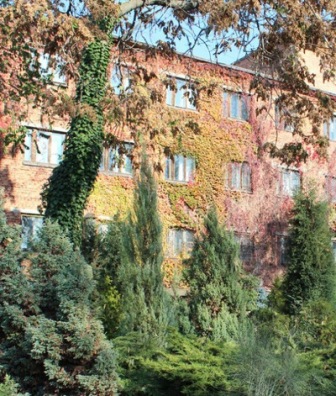
Botanical garden of DNU was organized in 1931. The founder and the first director of the garden was prof., head of the Department of Plant Physiology O.V. Rheingard, under whose guidance the first planting of plants from the garden collection was carried out. In 1933, the Botanical Garden was incorporated into the research departments of the university, and in 1963 it was declared as a territory protected by the state.
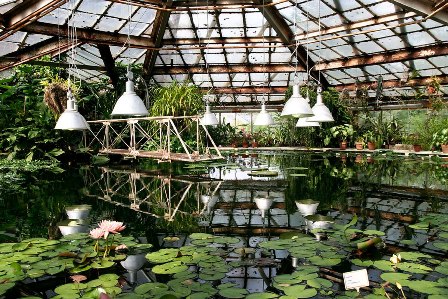
The Botanical Garden covers an area of 27.2 hectares. It consists of six laboratories – dendrology, floriculture, tropical and subtropical plants, fruit and vegetable production and seed, the main tasks of which are preservation and replenishment of the collection fund, acclimatization of introduced plants, development of methods for their reproduction and restoration. The collection fund of botanical garden plants is more than 3 thousand species, varieties and forms, including various "Red Book" plants.
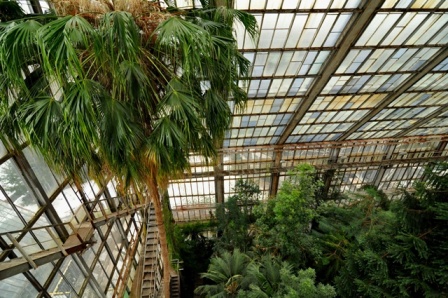
In the composition of individual sectors, much attention is paid not only to the demonstration of individual botanical taxa, but also to the identification of the decorative qualities of plants and the possibilities of using them in a landscape exposition. Work is underway to inventory the taxonomic composition of the dendrological collection, to develop problems of introducing dendroflora, to analyze the stability of individual generic complexes in the Steppe Dnieper region.
The scientific and production activities of the Botanical Garden are aimed at preserving and replenishing the collection of the gene pool of living plants, especially rare and unique. Collection funds are the basis for scientific and educational work on botany, ecology, nature protection, plant growing, ornamental gardening, landscape architecture; excursions for students and for the population of the city and region; a range of practical training for students of various specialties in biology and ecology, propagation of botanical and environmental knowledge.
Scientific and Scientific-technical Activities
Among all types of scientific activities, a special place is occupied by fundamental scientific research that determines the intellectual level of society, opens up new areas for applied research and innovation. The scientific schools of the biology and ecology faculty of the Oles Honchar DNU are well known in Ukraine and abroad.
Scientific School “Steppe Forestry”. It was founded by prof. O.L. Belgard and developed under the scientific supervision of Corresponding Member of NASU, Doctor of Biological Sciences, Honored Personality of Science and Technology, Professor A.P. Travleev. Today their efforts are successfully developed by the team of the Department of Geobotany, Soil Science and Ecology. The scientific school of new branches of knowledge – “Technogenic Soil Science”, “Technogenic Biogeocenology”, “Constructive Geobotanics”, “Pertinent Biogeocenology”, “Ecological Micromorphology of Soils” was founded. The scientific school solves the problems of ecology and steppe forest science – the theoretical basis of steppe forestry and forest land reclamation. For 60 years the Complex Expedition (CEDU) has been working on the study of natural and artificial forests of the steppe zone.
Scientific School “Molecular Biology and Plant Physiology”. Scientific leaders are Academician of UEAN, full member of the International Academy of Bioenergy Technologies, Honored Worker of Science and Education of Ukraine, Doctor of Biological Sciences, Professor А.M. Vinnichenko and a full member of the International Academy of Biotechnology, Doctor of Biological Sciences, Professor Yu.V. Lykholat.
The scientific school was founded in 1974 by Professor A.M. Vinnichenko in the Department of Plant Physiology and the Laboratory of Physiology and Molecular Biology of Plants of the Research Institute of Biology. Later, along with him took an active part in the development of the scientific direction and scientific school of Professor L.H. Dolhova and Yu.V. Lykholat.
The main direction of the scientific school is aimed at establishing the regularities of physiological, biochemical and genetic variability of plants during the complex influence of abiotic (radiation, heavy metals, herbicides, temperature stresses) environmental factors. Molecular-biological studies are focused on solving of theoretical and applied problems of the physiology of plant resistance. Particular attention is paid to the study of the role of phenolic compounds, proteins, aminoacids and sugars in the detoxication of heavy metals, the use of protein markers in solving applied and theoretical problems of plant genetic resources, studying the patterns of changes in the proteolysis system, the composition of lipids and proteins of cereal cell membranes under complex action conditions xenobiotics and extreme temperatures.

The main achievements of the scientific school include the decoding of aminoacid sequences of the molecular forms of the trypsin inhibitor, the physicochemical properties and structural features of prolamines, the functionally active proteins of the common and mutant (opayk-2) maize. On the basis of the results obtained, a mechanism has been developed for implementing the pleiotropic effect of recessive mutations of the type of an opayk-2, the criteria for selecting and evaluating the selection material for protein quality.
In the conditions of model and field experiments using specific and nonspecific criteria of phytotoxicity, the features of the regularities of the action of combined xenobiotics preparations with various sites of molecular action on the main sections of chains of metabolic reactions of plant test objects were established. Methods for diagnosing the resistance of plants to the combined action of toxicants have been developed and recommendations for the safe and effective use of herbicidal mixtures in cereal crops have been introduced into the practice of the agro-industrial complex.
During the period of the existence of the scientific school 8 doctors and 21 candidates of sciences were trained, 10 monographs, 101 manuals and methodical developments were published, including 6 with the stamp of the Ministry of Education and Science of Ukraine, more than 2000 scientific works, more than 20 patents, 37 author's certificates, 1 discovery, 2 grants for scientific development were received.
The scientific school “Physiology and biochemistry of microorganisms” was founded in the 70s of the 20th century by Dr. Med. Sciences, prof. Yu.S. Babenko, whose work was continued and significantly developed by the Honored Personality of Science and Technology of Ukraine, Head of the Department of Microbiology, Virology and Biotechnology, Dr. Biol. Sciences, prof. A.I. Vinnikov. The received results differ by scientific novelty and basic value for practical use in a number of branches of the national economy, environmental protection and health protection.
For the first time, the mechanisms of energy supply for the formation and transfer of bacterial resistance to a number of antibiotics were determined. The role of the proton-motive force in the translocation of nucleic acids, including the processes of genetic recombination in staphylococci, has been established. Effective diagnostic methods and schemes for the rational use of antibiotics are proposed.
The biological properties of producers have been studied and technological procedures for obtaining complex enzyme preparations of streptomycete origin and recommendations for their introduction in poultry farming, beekeeping, fish farming, livestock breeding, crop production of high-performance entomocidal preparations based on bacteria and fungi have been developed to protect crops from diseases and insect pests. A collection of genetically stable lines of fungi has been created, regulations have been developed, and production of a seed mycelium of Pleurotus ostreatus mushrooms has been established.
Now the biofilm growth of microorganisms is study. The main directions of regulation of film growth due to the influence of environmental factors such as antibiotics, bacteriophages, acidity of the nutrient, the content of sugars and metal ions, the presence of disinfectants, etc. have been studied on in vitro derived staphylococcal biofilms. For the first time, studies of the metabolic activity of biofilms have been carried out and the features of catabolic glucose metabolism in film forms of strains of staphylococci isolated from various biotopes of the human body have been established in comparison with the plankton cultures of these bacteria. Complex schemes were proposed using a number of factors to suppress film growth.
Scientific developments in the field of “Physiology and biochemistry of microorganisms” are known both in Ukraine and abroad. Employees of the department and research laboratory of the Research Institute of Biology received 27 copyright certificates, 4 international patents and 7 patents of Ukraine. Published more than 700 works, including about 100 abroad; two doctoral and 17 candidate theses were defended.
The scientific school “Structural and Functional Zoology” was founded by Professor V.L. Bulakhov. Later, along with him, a significant contribution to the development of the scientific school was made by the professor, Honored Personality of Science and Technology of Ukraine O.Ye. Pakhomov. The main scientific direction is the determination of the place and role of faunistic elements of zoocenosis in the structure and functioning of ecosystems and the biosphere, the participation of the animal population in biogeocoenotic processes (productive, protective, energy, biotic links, environment formation, soil-forming and other processes).
A network of objects of the nature reserve fund has been created, including the Dnipro-Orel Nature Reservation, the first in the region, more than 70 reservations that play a big role in restoring biodiversity in crisis environmental conditions.
New scientific directions are being developed: “Zoecological foundations for the rehabilitation of lands worked out by mining enterprises”, “Formation of a protected network in conditions of intense anthropogenic pressure” and “Adaptation of zoocenosis to anthropogenic changes in the environment”.
In the conditions of model and field experiments using specific and nonspecific criteria of phytotoxicity, the features of the regularities of the action of combined xenobiotics preparations with various sites of molecular action on the main sections of chains of metabolic reactions of plant test objects were established. Methods for diagnosing the resistance of plants to the combined action of toxicants have been developed and recommendations for the safe and effective use of herbicidal mixtures in cereal crops have been introduced into the practice of the agro-industrial complex.
During the period of the existence of the scientific school 8 doctors and 21 candidates of sciences were trained, 10 monographs, 101 manuals and methodical developments were published, including 6 with the stamp of the Ministry of Education and Science of Ukraine, more than 2000 scientific works, more than 20 patents, 37 author's certificates, 1 discovery, 2 grants for scientific development were received.
The scientific school “Physiology and biochemistry of microorganisms” was founded in the 70s of the 20th century by Dr. Med. Sciences, prof. Yu.S. Babenko, whose work was continued and significantly developed by the Honored Personality of Science and Technology of Ukraine, Head of the Department of Microbiology, Virology and Biotechnology, Dr. Biol. Sciences, prof. A.I. Vinnikov. The received results differ by scientific novelty and basic value for practical use in a number of branches of the national economy, environmental protection and health protection.
For the first time, the mechanisms of energy supply for the formation and transfer of bacterial resistance to a number of antibiotics were determined. The role of the proton-motive force in the translocation of nucleic acids, including the processes of genetic recombination in staphylococci, has been established. Effective diagnostic methods and schemes for the rational use of antibiotics are proposed.
The biological properties of producers have been studied and technological procedures for obtaining complex enzyme preparations of streptomycete origin and recommendations for their introduction in poultry farming, beekeeping, fish farming, livestock breeding, crop production of high-performance entomocidal preparations based on bacteria and fungi have been developed to protect crops from diseases and insect pests. A collection of genetically stable lines of fungi has been created, regulations have been developed, and production of a seed mycelium of Pleurotus ostreatus mushrooms has been established.
Now the biofilm growth of microorganisms is study. The main directions of regulation of film growth due to the influence of environmental factors such as antibiotics, bacteriophages, acidity of the nutrient, the content of sugars and metal ions, the presence of disinfectants, etc. have been studied on in vitro derived staphylococcal biofilms. For the first time, studies of the metabolic activity of biofilms have been carried out and the features of catabolic glucose metabolism in film forms of strains of staphylococci isolated from various biotopes of the human body have been established in comparison with the plankton cultures of these bacteria. Complex schemes were proposed using a number of factors to suppress film growth.
Scientific developments in the field of “Physiology and biochemistry of microorganisms” are known both in Ukraine and abroad. Employees of the department and research laboratory of the Research Institute of Biology received 27 copyright certificates, 4 international patents and 7 patents of Ukraine. Published more than 700 works, including about 100 abroad; two doctoral and 17 candidate theses were defended.
The scientific school “Structural and Functional Zoology” was founded by Professor V.L. Bulakhov. Later, along with him, a significant contribution to the development of the scientific school was made by the professor, Honored Personality of Science and Technology of Ukraine O.Ye. Pakhomov. The main scientific direction is the determination of the place and role of faunistic elements of zoocenosis in the structure and functioning of ecosystems and the biosphere, the participation of the animal population in biogeocoenotic processes (productive, protective, energy, biotic links, environment formation, soil-forming and other processes).
A network of objects of the nature reserve fund has been created, including the Dnipro-Orel Nature Reservation, the first in the region, more than 70 reservations that play a big role in restoring biodiversity in crisis environmental conditions.
New scientific directions are being developed: “Zoecological foundations for the rehabilitation of lands worked out by mining enterprises”, “Formation of a protected network in conditions of intense anthropogenic pressure” and “Adaptation of zoocenosis to anthropogenic changes in the environment”.

Scientific school “Neurochemistry”. At the Department of Biophysics and Biochemistry since 1963, a neurochemical school under the leadership of O.D. Reva function. The main research developments of the department's scientists were devoted to radiation neurochemistry (works by Berezin V.A., Gengin M.T., Shevchenko G.M., Dvoretsky A.I., Kukharenko R.I., Sokolova I.I., Chernoy V.I., etc.). The Department proposed and introduced into clinical institutions the immunochemical methods for the determination of neurospecific proteins and autoantibodies to them in serum and spinal fluid for the diagnosis of various pathological states of the nervous system (trauma, neuronal and glial tumor). Methods for the isolation and purification of some neurospecific proteins that are markers of neurons and glia have been developed, and monospecific antisera have been obtained. The developed micromethods for determine the components of the intercellular matrix, enzymes that can be used to monitor damage to the central nervous system.
Today, neurochemical studies continue prof. Ushakova G.O., prof. Nedzvetsky V.S., as well as lecturers and post-graduate students of the department.
The Department of Biophysics and Biochemistry maintains close ties with Lund University (Sweden), Copenhagen University (Denmark), the International Center for Scientific Research (Leipzig, Germany), the Center for Anti-Carcinogenic Research (Reims, France), the University of Firat (Turkey).
Today, neurochemical studies continue prof. Ushakova G.O., prof. Nedzvetsky V.S., as well as lecturers and post-graduate students of the department.
The Department of Biophysics and Biochemistry maintains close ties with Lund University (Sweden), Copenhagen University (Denmark), the International Center for Scientific Research (Leipzig, Germany), the Center for Anti-Carcinogenic Research (Reims, France), the University of Firat (Turkey).

The Faculty provides training of scientific and pedagogical staff in postgraduate and doctoral studies in specialty 03.00.16 “Ecology”, and postgraduate studies in the specialties “Plant Physiology”, “Physiology”, “Biochemistry”, “Microbiology” and “Radiobiology”.
Fuculty publish collections of scientific works included in the list of DAK as professional “Soil Science”, “Ecology and Noospherology”, “Issues of Steppe Forest Science and Forest Reclamation of Lands”, “Biosystems Diversity” and “Regulatory Mechanisms in Biosystems”. The last two titles are also presented in the leading international science-scope database the Web of Science and in some others.
Fuculty publish collections of scientific works included in the list of DAK as professional “Soil Science”, “Ecology and Noospherology”, “Issues of Steppe Forest Science and Forest Reclamation of Lands”, “Biosystems Diversity” and “Regulatory Mechanisms in Biosystems”. The last two titles are also presented in the leading international science-scope database the Web of Science and in some others.
Biosystems Diversity
Regulatory Mechanisms in Biosystems
Soil Science
Ecology and Noospherology
Issues of Steppe Forest Science and Forest Reclamation of Lands
International Cooperation
The Biological and Ecological Faculty collaborates with the following foreign institutions:
• University of Koblenz-Landau (Rhineland-Palatinate, Germany)
• Cordoba and Seville Universities (Cordoba, Seville, Spain)
• Ben-Gurion University (Be'er Sheva, Israel)
• Lund University (Lund, Sweden)
• Innovation Center (Chev, Poland)
• Kelanov Institute (Yablona, Poland)
• Stanford University (Stanford, California, USA)
The Department of Biodiversity and Ecology is one of the four regional Ukrainian centers of the International Black Soil Monitoring Network, which operates within the framework of the Global Soil Partnership (GSP) under the auspices of the Food and Agriculture Organization of the United Nations (FAO). Joint research on the soils of the steppe zone of Ukraine continues, involving the department’s scientific and teaching staff in collaboration with colleagues from the University of Córdoba and the University of Seville (Spain).
The Department of Biochemistry and Physiology continues scientific cooperation within existing agreements with Lund University (Sweden) and the Kelanov Institute of Animal Physiology (Yablona, Poland), including the continuation of experimental work on the project "Investigation of the pharmacokinetics and pharmacodynamics (PK/PD) of new enzymatic formulations and devices on a pig model for assessing the absorption of polyunsaturated fatty acids (PUFA) and peptides for brain and organ development."
With Professor Matthew Boyko from Ben-Gurion University (Israel), active cooperation is underway. For the Department of Biochemistry and Physiology students, a series of online lectures and practical sessions on neurophysiology (features of behavior in laboratory animals) have been conducted.
As part of distance academic mobility, training sessions on evolutionary genomics and bioinformatics are organized, and lectures and practical recommendations are presented by Fedor Kondrashov from the Institute of Science and Technology in Austria. A permanent "Journal Club" has been established based on this collaboration.
Several online seminars have been held with colleagues from Germany and Britain aimed at expanding international support for our students and researchers in the conditions of the war situation in Ukraine (DNU-GDCh Discussion), with the active backing from Michael J. Bojdys, Guest Professor in Organic Materials Chemistry at Humboldt University of Berlin, Department of Chemistry, Berlin, Germany.
Online meetings have been conducted with colleagues from Stanford University (USA) to discuss adapting training for specialists in biology and medicine to modern conditions. Professor Olena Severynovska completed a six-month internship at Stanford University in the Department of Developmental Biology.
During the 2024/2025 academic year, Professors G.O. Ushakova and O.V. Severynovska conducted lectures and seminars for the courses "Biochemistry" and "Higher Functions of the Central Nervous System" as part of online courses for Ukrainian students specializing in biology, pedagogy, and psychology. These courses were organized with the financial support of the German Academic Exchange Service (DAAD).
Students of the Faculty have won an International Grant to attend online courses in "Bioinformatics" and "Life Sciences" with a scholarship under the financial support program from the German Academic Exchange Service (DAAD).
Two students of Faculty of the Ecology specialty (Sharko M. and Fokin Y.) were studied at the University of Koblenz-Landau due to Master Program "Environmental Science" under the "Academic Mobility of the ERASMUS+" program in October 2017 – February 2018. The Department of Zoology and Ecology continues to work on harmonizing curricula for obtaining a double master’s degree, including distance learning.
Contact person – Associate Professor of the Department of Zoology and Ecology Gasso Viktor Yakovlevich.
The fruitful cooperation with the Department of Molecular Biology and Genetics of the Bingol University (Turkey) continues under the Agreement on Scientific, Technical and Educational Cooperation between the Oles Honchar Dnipro national University and Bingol University for 2016-2021. The results of joint research annually published in international journals and materials of international conferences.
Within the framework of the implementation of the current cooperation agreement between the Oles Honchar Dnipro National University and the Lund University (Sweden) Prof. Ushakova G.O. took an active part in the joint scientific experiment on the project "Dietary impact for the prevention of neuroinflammation and cognitive disorders".
According to the international project "DocHub – Structuring of cooperation in postgraduate studies, teaching of universal skills and academic writing at the regional level of Ukraine" (2017-2019), the ERASMUS+ program conducted the practical courses for postgraduate students of the Kyiv-Mohyla Academy, a working program for Neurochemistry (by English) was prepared.
The professor's meeting was organized in October 2018. José Manuel Recio Espejo, titular professor of the Department of Botany, Ecology and Plant Physiology at the University of Cordoba (Spain), Honorary Doctor of our University, responsible executor of the Agreement on Cooperation between Oles Honchar Dnipro National University and Kordoba University (Spain) and the Rector of DNU, Corr. National Academy of Sciences of Ukraine, Prof. Mykola Polyakov.
• University of Koblenz-Landau (Rhineland-Palatinate, Germany)
• Cordoba and Seville Universities (Cordoba, Seville, Spain)
• Ben-Gurion University (Be'er Sheva, Israel)
• Lund University (Lund, Sweden)
• Innovation Center (Chev, Poland)
• Kelanov Institute (Yablona, Poland)
• Stanford University (Stanford, California, USA)
The Department of Biodiversity and Ecology is one of the four regional Ukrainian centers of the International Black Soil Monitoring Network, which operates within the framework of the Global Soil Partnership (GSP) under the auspices of the Food and Agriculture Organization of the United Nations (FAO). Joint research on the soils of the steppe zone of Ukraine continues, involving the department’s scientific and teaching staff in collaboration with colleagues from the University of Córdoba and the University of Seville (Spain).
The Department of Biochemistry and Physiology continues scientific cooperation within existing agreements with Lund University (Sweden) and the Kelanov Institute of Animal Physiology (Yablona, Poland), including the continuation of experimental work on the project "Investigation of the pharmacokinetics and pharmacodynamics (PK/PD) of new enzymatic formulations and devices on a pig model for assessing the absorption of polyunsaturated fatty acids (PUFA) and peptides for brain and organ development."
With Professor Matthew Boyko from Ben-Gurion University (Israel), active cooperation is underway. For the Department of Biochemistry and Physiology students, a series of online lectures and practical sessions on neurophysiology (features of behavior in laboratory animals) have been conducted.
As part of distance academic mobility, training sessions on evolutionary genomics and bioinformatics are organized, and lectures and practical recommendations are presented by Fedor Kondrashov from the Institute of Science and Technology in Austria. A permanent "Journal Club" has been established based on this collaboration.
Several online seminars have been held with colleagues from Germany and Britain aimed at expanding international support for our students and researchers in the conditions of the war situation in Ukraine (DNU-GDCh Discussion), with the active backing from Michael J. Bojdys, Guest Professor in Organic Materials Chemistry at Humboldt University of Berlin, Department of Chemistry, Berlin, Germany.
Online meetings have been conducted with colleagues from Stanford University (USA) to discuss adapting training for specialists in biology and medicine to modern conditions. Professor Olena Severynovska completed a six-month internship at Stanford University in the Department of Developmental Biology.
During the 2024/2025 academic year, Professors G.O. Ushakova and O.V. Severynovska conducted lectures and seminars for the courses "Biochemistry" and "Higher Functions of the Central Nervous System" as part of online courses for Ukrainian students specializing in biology, pedagogy, and psychology. These courses were organized with the financial support of the German Academic Exchange Service (DAAD).
Students of the Faculty have won an International Grant to attend online courses in "Bioinformatics" and "Life Sciences" with a scholarship under the financial support program from the German Academic Exchange Service (DAAD).
Two students of Faculty of the Ecology specialty (Sharko M. and Fokin Y.) were studied at the University of Koblenz-Landau due to Master Program "Environmental Science" under the "Academic Mobility of the ERASMUS+" program in October 2017 – February 2018. The Department of Zoology and Ecology continues to work on harmonizing curricula for obtaining a double master’s degree, including distance learning.
Contact person – Associate Professor of the Department of Zoology and Ecology Gasso Viktor Yakovlevich.
The fruitful cooperation with the Department of Molecular Biology and Genetics of the Bingol University (Turkey) continues under the Agreement on Scientific, Technical and Educational Cooperation between the Oles Honchar Dnipro national University and Bingol University for 2016-2021. The results of joint research annually published in international journals and materials of international conferences.
Within the framework of the implementation of the current cooperation agreement between the Oles Honchar Dnipro National University and the Lund University (Sweden) Prof. Ushakova G.O. took an active part in the joint scientific experiment on the project "Dietary impact for the prevention of neuroinflammation and cognitive disorders".
According to the international project "DocHub – Structuring of cooperation in postgraduate studies, teaching of universal skills and academic writing at the regional level of Ukraine" (2017-2019), the ERASMUS+ program conducted the practical courses for postgraduate students of the Kyiv-Mohyla Academy, a working program for Neurochemistry (by English) was prepared.
The professor's meeting was organized in October 2018. José Manuel Recio Espejo, titular professor of the Department of Botany, Ecology and Plant Physiology at the University of Cordoba (Spain), Honorary Doctor of our University, responsible executor of the Agreement on Cooperation between Oles Honchar Dnipro National University and Kordoba University (Spain) and the Rector of DNU, Corr. National Academy of Sciences of Ukraine, Prof. Mykola Polyakov.
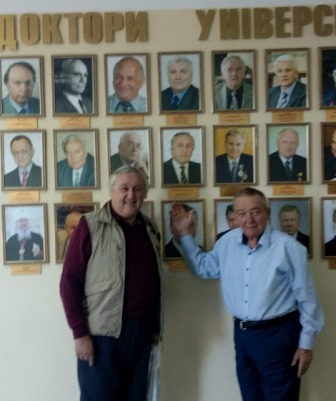
The issue of cooperation on academic mobility of students and teachers was discussed. Prof. Recio assured that in March 2019 he would make a statement regarding the inclusion of our university in the ERASMUS+ program. Both sides noted that it is necessary to use the scientific potential of the two universities more actively and to participate in international scientific programs, in particular in the Horizon-2020program. Prof. Recio as deputy editor-in-chief of the journals "Ecology and Noospherology" (ISSN 1726-1112) and "Soil Science" (ISSN 1684-9094), published in the DNU and included in the international databases, he emphasized the gradual transition of journals to the Scopus and Web of Science Core Collection scientific databases.
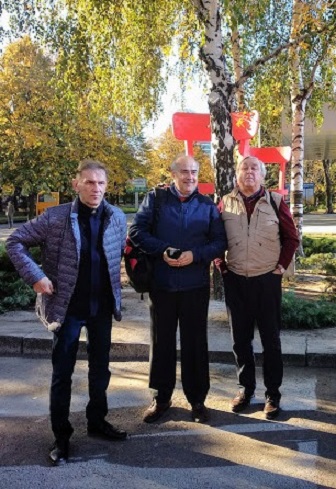
The Spanish delegation during the celebration of the 100th anniversary of the DNU
Scientists of Faculty of Biology and Ecology received international scholar grants from DAAD, NATO, Polish Academy of Sciences, Ukrainian-Hungarian, Soros Foundation, Federation of European Biochemical Societies and others.
Teachers, researchers, post-graduate students and masters of the Faculty take an active part in the many international conferences and international schools for young scientists each year.
Student’s Life
Students of the faculty are involved in scientific work, doing term papers, diploma and master's theses. Each department has a scientific student society and branches of Ukrainian scientific societies (biochemical, ornithological, botanical, herpetological, microbiological, Ukrainian society of cellular biology and many others).
Students of the faculty annually become a winners of All-Ukrainian contests of student scientific theses, olympiads in specialty, excellent students of the study, who receive a scholarship from the Pinchuk Foundation “Zavtra.UA”, a personal scholarship of the Academic Council of DNU, M.S. Hrushevsky personal scholarship, etc.

Announcement of the winners: "Day of freshman - 2016"
Cultural events are held at the faculty: Day of the Faculty, Day of the 1st course student (Defense of the Specialty), Health Days, thematic evening parties for students and lecturers, meetings with alumni etc. Our students actively participate in artistic amateur performances. Attention is given to students of preferential categories who need special social protection. Students have the possibility to undergo rehabilitation at the recreation corts of university. The board of students took patronage over the children's home No. 1: several times a month they visit children, communicate with them, play games, contests, help them to do their homework; conducted with them a series of excursions to nature; hold a permanent charity event "Warm clothes for orphans". Students take part in city volunteer activities, in particular, they are participants of donor days, actively collect things and medicines for victims and displaced people from the ATO zone, are volunteers of city animal protection organizations, take part in city environmental events and many other.
Much attention is paid to the development of student self-government, which today covers various aspects of student life. Work in the Council of Student Self-Government is carried out by sectors: informational; sports; social; scientific; guard of nature; cultural and mass; organizational, where everyone can find a job by their strengths and interests.
Much attention is paid to the development of student self-government, which today covers various aspects of student life. Work in the Council of Student Self-Government is carried out by sectors: informational; sports; social; scientific; guard of nature; cultural and mass; organizational, where everyone can find a job by their strengths and interests.



